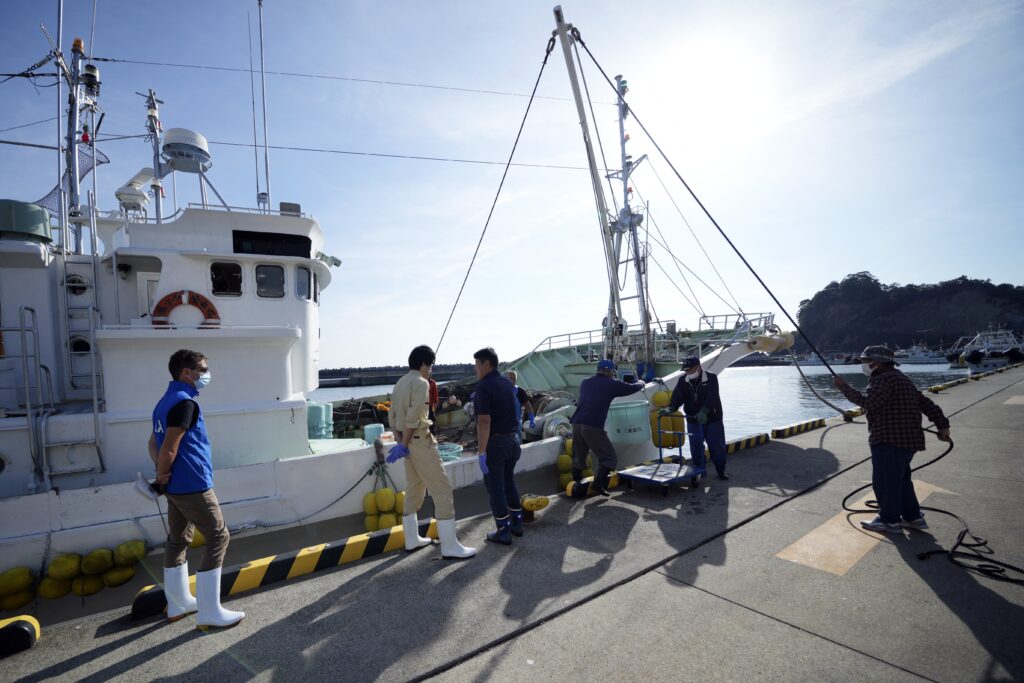
- ARAB NEWS
- 02 Jul 2025

TOKYO: Japan’s release of treated water from the meltdown-stricken Fukushima No. 1 nuclear power plant into the Pacific Ocean is still overshadowing the country’s relations with China six months after the start of the measure.
To address other countries’ concerns about the impact of the release of treated water containing radioactive tritium into the sea, the Japanese government has worked hard to offer explanations about the safety of the measure.
Thanks to the endorsement from the International Atomic Energy Agency about the safety of the water release, Tokyo has gained a certain level of understanding from the international community.
However, China, which was a major importer of Japanese fishery products, imposed a blanket import ban on such products, still criticizing the water as being “nuclear contaminated.” Although Japan and China have been trying to find a solution through dialogue, the prospect of Beijing lifting the ban is not yet in sight.
“We are communicating with China at various levels,” Japanese Deputy Chief Cabinet Secretary Hiroshi Moriya told a press conference Friday. “We will continue to give careful explanations and strongly seek the immediate removal of import restrictions.”
China’s introduction of the import ban announced immediately after the start of the water discharge on Aug. 24 last year upset many Japanese government officials, with one saying, “We didn’t expect China to go that far.”
As scallops and other mainstay items were hit hard by the import ban, China-bound exports of Japanese fishery products in 2023 plunged by some 30 pct from the previous year in value terms.
Japanese Prime Minister Fumio Kishida has repeatedly stressed the safety of the water release at international meetings and during summit talks. The Japanese Foreign Ministry has been monitoring reports from various countries to check for false information that could lead to harmful rumors and Japan accepted a delegation of experts from South Korea to let the country assess the situation on its own.
In dealing with the matter, Japan attached particular importance to Pacific island countries, which became nuclear test sites for the United States, Britain and France in the past and expressed strong concern about Japan’s water release. Japan invited the leaders of such countries to seek their understanding and eventually succeeded in gaining support from Micronesia and other countries that initially opposed the measure.
The IAEA has unalterably evaluated Japan’s response as “consistent with relevant international safety standards” since before and after the start of the water discharge. IAEA Director-General Rafael Grossi will visit Japan from March 12 and inspect the Fukushima No. 1 plant again.
As the understanding of the international community has spread, Kishida described Beijing’s response as “an outstanding action” that goes against the global trend. While calling for China’s import ban to be lifted, the Japanese side offered to provide explanations by experts, but the Chinese side was slow to respond.
At the Japan-China summit in November last year, the two countries finally agreed to hold discussions at the expert level. Still, even at this summit, Chinese President Xi Jinping described the treated water as “nuclear-contaminated water.” The first round of talks by the two countries’ experts in January this year were held behind closed doors in consideration of Chinese public sentiment critical of the water release and the two sides remained apart during the discussions, according to an official of the Japanese Foreign Ministry.
The Chinese side showed its intention to maintain dialogue with Japan on the matter, and in February, Japanese and Chinese Foreign Ministry bureau chiefs held talks. Some Japanese government officials said that “the situation may be improving,” but they are still not fully optimistic.
A series of problems that occurred at the Fukushima plant, including leaks of contaminated water, are feared to affect the bilateral talks. Concerned about such circumstances, the prime minister instructed relevant ministers to give careful explanations at home and abroad.
With China’s National People’s Congress starting its annual session on Tuesday, the prevailing view within the Japanese government is that “the import ban will not be lifted in the immediate future,” a source close to the prime minister said.
JIJI Press